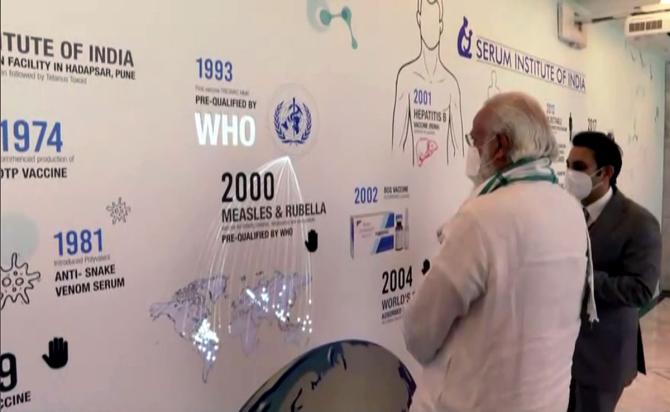Individuals will have concerns about material that flows through the government, on questions of purity, perfection of the cold chain, and correctness of procedures.
Even if a government programme is able to solve all these problems, it will be limited in scale-up, argues Ajay Shah.

Some people think the government will run the COVID-19 vaccination programme.
Many vaccines will come about for COVID-19.
Many private persons have the incentive to buy the vaccine.
Many private firms have the incentive to part-fund the vaccine for employees or customers.
Our thinking about vaccination in India should respect the market process and the limitations of State capacity.
Sometimes we think of a gigantic government project, where all the vaccines will only be in the hands of the government, and we will all obediently queue up (or pull strings) in order to get vaccinated.
Things are likely to work out differently.
Three vaccines have shown good test results. This shows chinks in the armour of Sars-Cov-2, and as a consequence, many other vaccine projects are also likely to succeed.
The world market will thus have numerous efficacious vaccines. They will have interesting differences in operational complexity (how cold does the cold chain have to be? One dose or two?), efficacy (some will work better than others for the old, or women), and cost.
Myriad private persons want the vaccine and are willing to pay for it. We have demand and supply, and that makes a market and a price.
All of us are soon going to be swapping tales about which Organisation for Economic Co-operation and Development country has approved a certain vaccine, that is available from a certain vendor at a certain price.
This is how the self-organising system of human society works.
For us in India, we can free ride on the vaccine approval process of the OECD countries and thus know which vaccines are safe and effective.
Many firms have the incentive to buy vaccines for their employees. This could sometimes extend to customers also.
It makes sense for an airline to put up Rs 1,000 per frequent flyer, as part-payment for a vaccine, in order to jump-start ordinary patterns of travel, and hence the demand for air travel.
There will be healthy price negotiations between corporations buying thousands of doses versus a vaccine industry selling these doses and associated services.
Co-operative housing societies found the internal capacity for co-operation, in the pandemic, to co-ordinate purchases of groceries. Many of them will now organise themselves to set up a vaccination camp on a designated day.
This spontaneous order will work better than a government programme.
The Indian State has low operational capabilities. Individuals will have concerns about material that flows through the government, on questions of purity, perfection of the cold chain, and correctness of procedures at the frontline.
Even if a government programme is able to solve all these problems, it will be limited in scale-up. The passion, management capabilities, and response to local conditions, which will be found with tens of thousands of ground-level initiatives, are superior.
What can go wrong? Some vaccine delivery organisations (private or State) will fail on operations, thus delivering duds (either knowingly or unknowingly). A few brand names will find the energy to get this right, and earn the respect and loyalty of millions, and a few brand names will get sullied in the process.
The entire problem of production -- cold chain -- and front-line delivery will be expensive at first.
There is the danger of government intervention in terms of price control. This will work badly. There is ample competition in this market. Numerous vaccine manufacturers, and health care organisations, will be in the fray.
At first, prices will be high, and then they will rapidly go down.
As an example, there was significant government intervention in the testing and personal protective equipment markets, but with the benefit of hindsight, we know that market forces sorted this out, and there was a price crash after high prices elicited a supply response.
Government intervention in the testing and PPE market only generated delays for the scale-up of PPE and testing in India.
Similarly, if State power is used to try to do price controls for vaccines, it will reduce the pace of immunisation in the country.
If the government announces that the actions taken with PPE or testing will not be repeated, this will reduce risk as seen in private firms, and elicit bigger investments in building the vaccination business.
By now, a large fraction of India is immune to COVID-19. The survey evidence shows considerable seroprevalence for the urban poor. It makes sense for individuals below the age of 35 to just do an antibody test, and skip the vaccine if this is positive. This will crimp vaccine demand.
In some parts of India, with significant seroprevalence, a modest scale of immunisation will tip the system over into herd immunity, and then in a month or so, the epidemic will die out.
When cases are no longer recorded in friends and family, this will adversely impact on vaccine demand.
This process will be assisted if foundational public goods, of the health statistical system, are strengthened in the form of weekly data for seroprevalence and all-causes death, in each pin code.
Putting these things together, we can envision a demand collapse (as cities and regions go into herd immunity) and a supply boom (as multiple vaccine manufacturers get into full production, and private firms figure out the cold chain and front-line processes).
Policymakers need to choose among three paths.
The first path consists of tendering private firms to supply vaccination services for civil servants, and building State capacity for public goods of the health statistical system.
The second path consists of trying to build a centrally-planned vaccine rollout for the people, but retaining humility and not interfering with the working of the private market.
The third path consists of using the coercive power of the State to interfere in the private market, with tools like import restrictions, bans on certain vaccines, price regulation, forcing manufacturers to supply to the government, etc. In this case, the difficulties of the government enforcement apparatus will be faced.
Ajay Shah is an independent scholar.
Feature presentation: Mahipal Soni/Rediff.com











